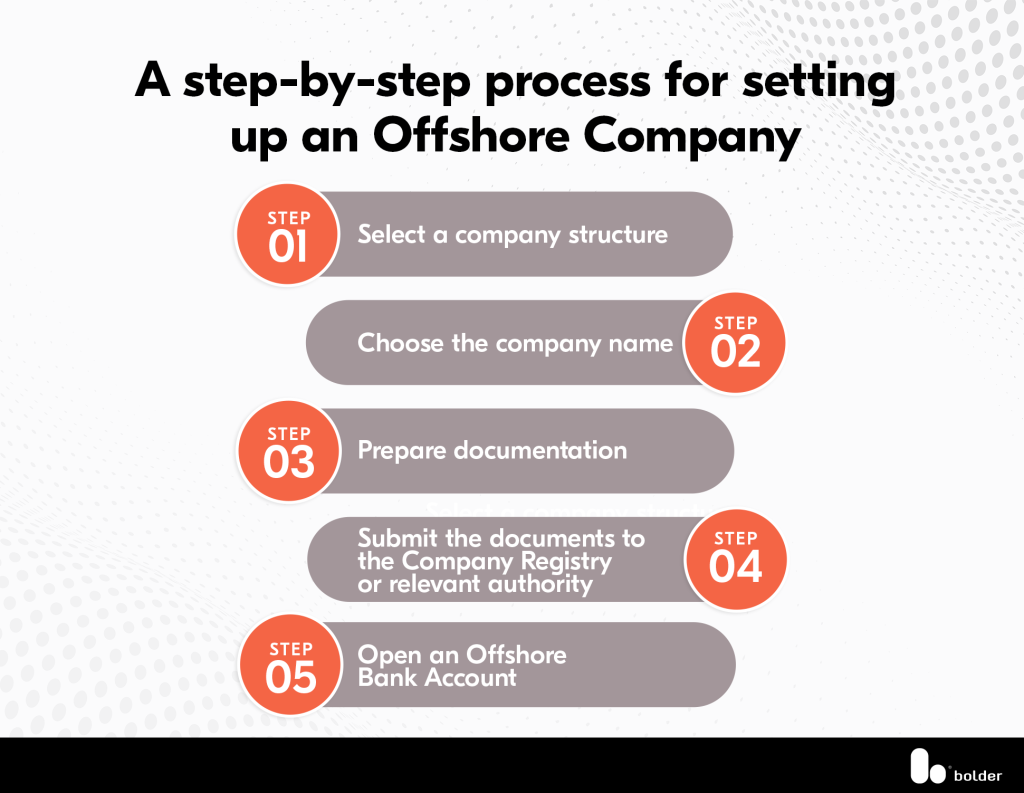How Offshore Firm Formations Work: A Detailed Summary for Business Owners
Offshore company formations can supply substantial advantages for entrepreneurs looking for tax obligation optimization and asset security. The procedure includes several essential steps, beginning with cautious territory choice and detailed documents prep work. Engaging professional solutions is crucial for compliance. Lots of ignore the recurring responsibilities that comply with preliminary registration. Understanding these intricacies can make a substantial distinction in leveraging overseas possibilities properly. The following actions are important for lasting success.
Comprehending Offshore Companies: What They Are and Why They Issue
The idea of overseas firms may seem complicated, comprehending their essential nature and value is important for both people and companies looking for to enhance their monetary methods. Offshore business are entities signed up outside the individual's nation of home, commonly in territories that offer favorable governing atmospheres. These services can offer various benefits, such as tax optimization, possession security, and improved personal privacy.
For entrepreneurs, developing an overseas firm can facilitate global profession, reduce functional prices, and expand market reach. Additionally, offshore companies usually permit structured compliance with global regulations. People may also make use of offshore structures to protect individual properties from economic or political instability in their home countries. Ultimately, the allure of overseas companies depends on their capability to boost economic flexibility and give calculated advantages in an increasingly interconnected international economic situation - Offshore Company Formations. Understanding their operational framework and benefits is important for making informed choices
Choosing the Right Jurisdiction for Your Offshore Business
Selecting the suitable territory for an overseas firm is essential for making best use of tax benefits and ensuring conformity with local guidelines. Different jurisdictions offer differing tax rewards and regulative settings that can substantially impact service procedures. A cautious analysis of these factors is essential for educated decision-making.
Tax Advantages Review
When thinking about the establishment of an offshore firm, recognizing the tax advantages related to numerous territories is essential. Different areas provide special benefits, such as reduced or zero corporate tax obligation prices, which can considerably boost profitability. Some territories provide tax obligation rewards for details kinds of businesses, attracting entrepreneurs seeking decreased tax obligation obligations. In addition, particular nations enforce favorable tax treaties that reduce dual taxation on international income, making sure that organizations preserve more revenues. The selection of territory likewise impacts value-added tax (VAT) and other neighborhood tax obligations. Business owners must evaluate these factors thoroughly to select an area that aligns with their service goals, enhancing tax obligation effectiveness while staying certified with international guidelines.
Regulatory Environment Considerations
Selecting the ideal jurisdiction for an offshore firm needs a thorough understanding of the regulatory atmosphere, as different countries impose differing levels of conformity and administration. Business owners must review factors such as lawful frameworks, tax laws, and reporting commitments. Territories like the British Virgin Islands and Cayman Islands are frequently preferred for their business-friendly legislations and minimal coverage needs. Alternatively, some countries might enforce strict regulations that could complicate procedures and enhance expenses. In addition, the political stability and credibility of a territory can affect the long-lasting practicality of the offshore business. Cautious factor to consider of these regulatory elements is necessary to ensure that the picked territory straightens with the business's functional demands and calculated goals.
Functional Preparing the Required Paperwork
Preparing the required documents is a crucial step in the overseas company formation procedure. Entrepreneurs have to collect different legal and identification documents to facilitate their business's establishment in an international jurisdiction. Usually, this includes a thorough company plan describing the business's goals and functional techniques. Furthermore, personal recognition files, such as tickets or vehicle driver's licenses, are required from the firm's shareholders and supervisors.
Oftentimes, proof of address, like utility costs or financial institution statements, is necessary to verify the identities of the entailed parties. Additionally, details types determined by the jurisdiction, including application types for enrollment, have to be finished accurately. Some jurisdictions might also require an affirmation of the nature of company activities and conformity with regional laws. Completely preparing these files guarantees a smoother registration process and helps mitigate potential hold-ups or difficulties, eventually setting a solid foundation for the overseas entity.
Involving Professional Providers for Offshore Development
Involving specialist services in overseas development can greatly enhance the efficiency and efficiency of the procedure. Business owners often face intricacies that can be frustrating, making expert assistance vital. Expert firms specializing in overseas formations give a riches of expertise concerning territory choice, business structure, and local market problems.
These experts can aid in drafting vital paperwork, guaranteeing precision and conformity with details needs. They also aid streamline communication with neighborhood authorities, reducing the possibility of misconceptions or delays. On top of that, expert solutions can supply insights right into critical benefits, such as tax obligation benefits and asset protection, customized to the business owner's certain demands.
Navigating Regulatory Compliance and Legal Demands
Recognizing the regulative landscape is essential for business owners starting on offshore firm formations. Compliance with global laws and regional laws is vital to stay clear of lawful pitfalls. Each jurisdiction has particular needs concerning firm enrollment, reporting, and taxation, which should be thoroughly investigated.
Business owners should acquaint themselves with the policies governing business framework, ownership, and functional techniques in the chosen offshore area. Additionally, anti-money laundering (AML) and recognize your customer (KYC) policies often apply, requiring appropriate paperwork and confirmation procedures.
Involving with attorneys that focus on offshore solutions can provide invaluable assistance on maneuvering via these intricacies. Ensuring conformity not only secures the firm from potential lawful problems yet additionally improves integrity with investors, regulatory authorities, and partners. By sticking to the proposed legal structures, entrepreneurs can effectively utilize the advantages of overseas company formations while decreasing threats connected with non-compliance.
Establishing Banking and Financial Accounts

When a suitable financial institution is determined, business owners usually require to prepare and submit different records, including proof of identity, service enrollment papers, and a summary of the desired organization tasks. (Offshore Company Formations)
Some banks may additionally call for a minimum deposit to open up an account. Entrepreneurs ought to be prepared to respond to questions concerning the source of funds and business operations. By extensively comprehending the banking landscape and abiding by the financial institution's requirements, entrepreneurs can safeguard their overseas business has seamless access to essential monetary solutions for reliable operation.
Maintaining Your Offshore Business: Ongoing Responsibilities and Finest Practices
Maintaining an offshore company involves a number of recurring responsibilities that are vital for compliance and operational honesty. Key facets include sticking to yearly conformity needs, maintaining accurate economic documents, Learn More Here and recognizing tax obligations. These elements are crucial for guaranteeing the business's longevity and lawful standing in its territory.
Annual Conformity Demands
While developing an overseas firm offers countless advantages, it likewise requires continuous obligations that can not be forgotten. Annual conformity demands vary by territory however typically consist of sending monetary declarations and annual returns to local authorities. Companies need to also pay annual fees, which can consist of registration renewals and taxes, relying on the area. Furthermore, many territories require preserving a licensed workplace and a local representative. Failure to comply with these policies can result in charges, consisting of penalties or perhaps dissolution of the firm. Entrepreneurs should also recognize any adjustments in regional regulations that might influence their conformity commitments. Remaining informed and organized is vital for keeping the advantages of an offshore business while fulfilling lawful obligations effectively.
Keeping Financial Records
Compliance with yearly needs is just component of the recurring responsibilities related to overseas company monitoring. Keeping precise economic records is vital for guaranteeing transparency and responsibility. Business owners must methodically record all deals, including revenue, expenses, and assets. This method not just aids in internal decision-making but also prepares the firm for prospective audits from regulative authorities.
On a regular basis upgrading monetary declarations, such as revenue and loss accounts and annual report, is vital for tracking the company's economic health and wellness. Utilizing accountancy software can simplify this procedure, making it much easier to produce reports and preserve conformity. In enhancement, business owners must take into consideration seeking expert accountancy services to guarantee adherence to regional guidelines and finest techniques, consequently guarding the honesty and online reputation of their overseas operations.

Tax Obligation Commitments Overview
Guiding with the intricacies of tax responsibilities is crucial for the effective administration of an offshore firm. Business owners must comprehend the tax obligation policies of both their home nation and the jurisdiction where the overseas entity is established. Compliance with local tax laws is important, as failing to stick can cause fines or legal issues. Routinely filing necessary income tax return, also when no tax might be owed, is usually required. Furthermore, preserving exact and updated monetary records is necessary for demonstrating compliance. Consulting view publisher site from tax professionals acquainted with global tax obligation law can aid navigate these commitments effectively. By applying best methods, entrepreneurs can ensure that their overseas procedures stay monetarily sensible and lawfully compliant.

Often Asked Questions
Exactly how Lengthy Does the Offshore Firm Development Refine Typically Take?
The offshore business development process normally ranges from a couple of days to numerous weeks. Elements affecting the timeline consist of territory, paperwork needs, and responsiveness of legal and financial institutions associated with the configuration.
What Are the Expenses Connected With Preserving an Offshore Firm?
The costs related to maintaining an offshore firm can vary extensively. They generally include annual registration charges, conformity costs, accounting services, and feasible legal costs, depending on the jurisdiction and details service tasks included.
Can I Open a Personal Savings Account for My Offshore Business?
Opening up an individual checking account for an overseas business is typically not permitted. Offshore accounts need to be service accounts, mirroring the firm's activities, therefore adhering to laws and making certain correct economic monitoring and legal liability.
Are There Restrictions on Foreign Possession of Offshore Business?

What Happens if I Fail to Adhere To Offshore Laws?
Failing to comply with offshore regulations can result in extreme penalties, consisting of significant penalties, loss of business licenses, and potential criminal costs. Furthermore, non-compliance may cause reputational damages and problems in future business operations.
Offshore business are entities registered outside the individual's nation of home, commonly in jurisdictions that offer desirable regulatory environments. Picking the appropriate territory for an offshore company is essential for making best use of tax obligation advantages and guaranteeing compliance with local policies. When taking into consideration the establishment of an overseas company, understanding the tax obligation advantages linked with different jurisdictions is important. Selecting the best territory for an offshore business calls for an extensive understanding of the regulatory atmosphere, as different nations impose varying degrees of conformity and governance. Additionally, the political security and online reputation of a jurisdiction can influence the long-term stability of the overseas business.